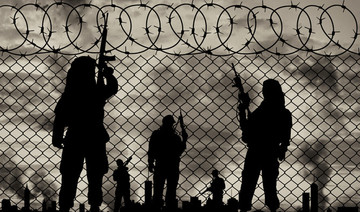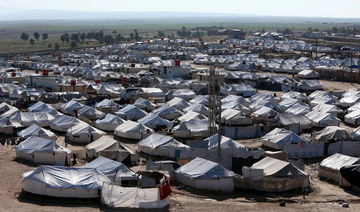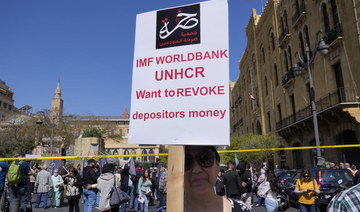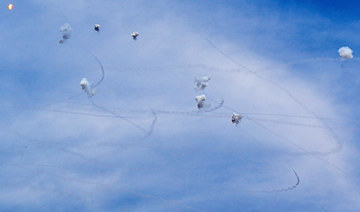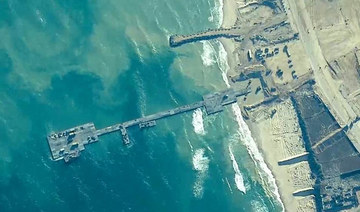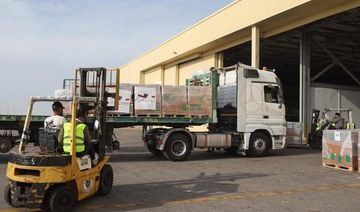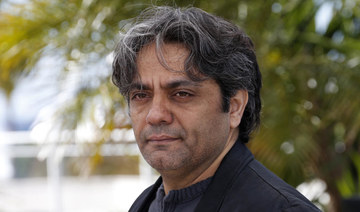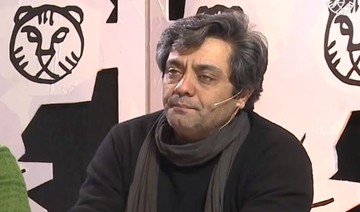BEIRUT: Syria’s Druze minority, targeted by deadly Daesh group attacks and kidnappings last week in Sweida, had managed to keep itself relatively insulated from the country’s seven-year war.
Here is a summary of the community’s profile, its role in Syria’s conflict and previous attacks against it.
With around 700,000 people, the Druze community accounted for around three percent of Syria’s pre-war population of 23 million.
They are located mainly in the southern province of Sweida with smaller pockets around Damascus and in the northwest, although some have fled extremist held parts of the latter area.
Druze are monotheistic and considered Muslim, but the sect is otherwise highly secretive, includes mystical elements like reincarnation, and does not allow new converts.
Some 200,000 Druze are located in neighboring Lebanon and over 100,000 are in Israel, while 18,000 live in the Israeli-occupied Golan.
Syria’s Druze have been split by the uprising that erupted in 2011 against President Bashar Assad, who had long portrayed himself as a protector of the country’s minorities.
Druze should not be seen “as being neutral in this war — it’s more multifaceted and the Druze are not a monolithic bloc,” said Tobias Lang, an analyst focused on Druze populations in the Middle East.
One of the first soldiers to defect from Syria’s army in protest at its handling of demonstrations was Druze officer Khaldun Zeineddine, who later died in clashes against regime forces.
Others remained firmly loyal, like General Issam Zahreddine, one of the highest-ranking Druze army officers who died last year in a mine blast after battling the Daesh group in Syria’s east.
Druze leaders have often tried to maintain a precarious relationship with the regime to keep their areas autonomous and spare them from government attacks.
One symbol of that complex relationship was Wahid Al-Balous, a Druze religious authority who pushed for the sect’s soldiers to be deployed near their hometowns, rather than in other provinces.
Balous, who died in a car bomb attack in Sweida in 2015, spoke out against both extremists and Assad.
Syria’s Druze have protected their heartland in Sweida with their own forces.
The most powerful has been the Sheikhs of Dignity, which was headed by Balous and included fighters and other religious figures.
Sheikhs of Dignity has fought fierce battles against the Daesh group and Al-Qaeda’s Syrian affiliate.
Other militia have been closely linked to the regime, including the Dareh Al-Watan (Shield of the Nation), a Druze force founded in April 2015 with 2,000 fighters.
The militia appear to have protected Sweida’s sons from compulsory military service, with authorities turning a blind eye so long as young men fight in units not opposed to the regime.
Suicide bombs and shootings carried out by Daesh in Sweida on Wednesday left more than 250 people dead, mostly civilians, and the extremists reportedly kidnapped more than 30 Druze women and children.
The attacks were by far the worst against the Druze community in seven years of war, but they were not the first.
A car bomb in 2012 ripped through Damascus’ Jaramana suburb, which is mostly Druze and Christian.
In 2013 and 2014, fierce fighting between Syrian rebels and pro-regime Druze forces rocked Sweida province and Druze areas closer to Damascus.
Daesh began attacking Sweida province in 2015, first targeting Khalkhalah military airport.
That same year, 20 Druze Syrians were killed in a shoot-out with Al-Qaeda extremists in the village of Qalb Lawzah in northwestern Idlib province.
Druze residents of Qalb Lawzah had come out against the regime a year into Syria’s uprising.
In 2016, Daesh beheaded four laborers in an area it controlled outside Damascus, accusing them of being Druze.
And in 2017, a car bomb killed nine people in Hader, a regime-held village in the southwestern province of Quneitra mostly populated by Druze.
Syria’s Druze minority walk a war-time tightrope
Syria’s Druze minority walk a war-time tightrope
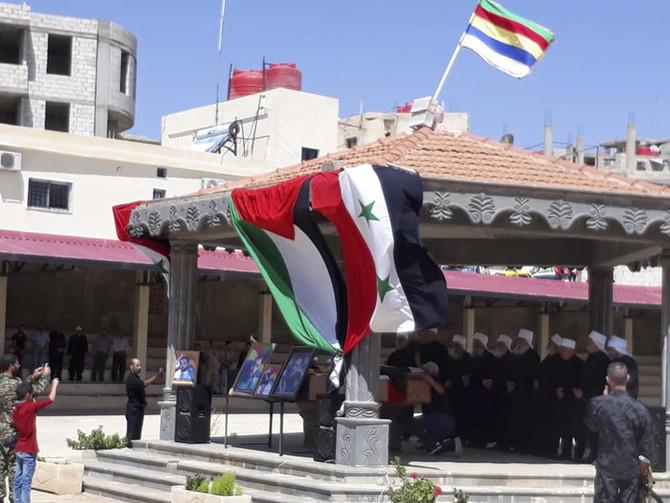
- The Druze in Syria had managed to keep themselves relatively insulated from the country’s seven-year war
- Suicide bombs and shootings carried out by Daesh in Sweida on Wednesday left more than 250 people dead
Syrian Kurds hand over a British woman, 3 children linked to Daesh to UK officials

QAMISHLI: A British woman and three children linked to Daesh in Syria were handed over to a UK delegation that visited the region this week, Syrian Kurdish-led authorities said on Friday.
The handover, which took place on Wednesday, is the latest in a push to repatriate people from Al-Hol and Roj camps in northeastern Syria that house tens of thousands, mostly wives and children of Daesh militants but also supporters of the extremist group.
The Kurdish authorities did not release the names of the four, saying only they were held at Roj camp before the handover.
According to a statement, a delegation led by Britain’s Special Representative for Syria Ann Snow, visited northeastern Syria, where they discussed with the Kurdish authorities the ongoing threat that Daesh still poses, five years after the extremists lost the last sliver of land they once controlled in large parts of Iraq and Syria.
Elham Ahmad, the co-chair for foreign relations in the regional Syrian Kurdish administration, said: “Radical solutions should be found for the problem of terrorism.”
Thousands of Daesh members and suspects held in jails in northeast Syria should face justice, she added.
In 2014, Daesh declared a caliphate in large parts of Iraq and Syria and attracted tens of thousands of supporters from around the world.
The extremists were defeated by a US-led coalition in Iraq in 2017 and in Syria in 2019.
Tens of thousands of people linked to the group were taken to Al-Hol camp, close to the Iraqi border.
Over the past five years, about 30,000 people, mostly Iraqis and Syrians, have left the Al-Hol camp and been repatriated.
More than 2,000 are also held in Roj camp.
Earlier this month, the US said it repatriated 11 of its citizens from the Al-Hol and Roj camps, the largest group to date that Washington has taken out of the two sprawling camps.
Earlier in May, more than 200 Syrians were taken from Al-Hol to their hometowns in Syria’s eastern province that borders Iraq.
Four Britons repatriated from Syria camp, Kurds say
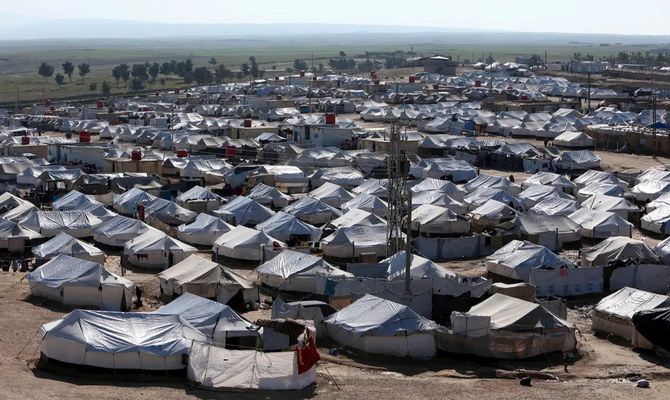
- The Kurdish administration said it had “handed over a woman and three children to the United Kingdom“
- The four had been interned in the Roj camp where militants’ relatives are held
QAMISHLI, Syria: Kurdish authorities in northeast Syria said Friday that they had handed over a woman and three children to British representatives for repatriation, with a source saying they had been held in a camp for militants’ relatives.
Five years after the Daesh group was driven out of its last bastion in Syria, tens of thousands of the militants’ family members, including from Western countries, remain in detention camps in the Kurdish-controlled northeast.
The Kurdish administration said it had “handed over a woman and three children to the United Kingdom,” following a meeting with a British delegation led its Syria envoy Ann Snow.
A source within the administration told AFP the four had been interned in the Roj camp where militants’ relatives are held.
Britain’s foreign ministry said UK officials had “facilitated the repatriation of a number of British nationals from Syria to the United Kingdom.”
“This repatriation is in line with the long-standing policy that all requests for UK consular assistance from Syria are considered on a case-by-case basis, taking into account all relevant circumstances including national security,” the spokesperson said.
On May 7, the United States announced it had brought back 11 Americans including five minors, as well as a nine-year-old non-US sibling of an American, from internment camps in northeastern Syria.
The United States in the same operation facilitated the repatriation of six Canadian citizens, four Dutch citizens and one Finnish citizen, eight of them children, Secretary of state Antony Blinken said.
And in December, the Kurdish administration handed over to Britain a woman and five children who had also been held in a camp.
Despite repeated appeals by the Kurdish authorities, a number of Western countries have refused to take back their citizens from the camps.
Among the most high profile cases is that of Shamima Begum, a former Briton stripped of her citizenship after leaving the country aged 15 to marry an Daesh group fighter.
Lebanon ‘open to any effort to curb Israeli aggression,’ says Berri
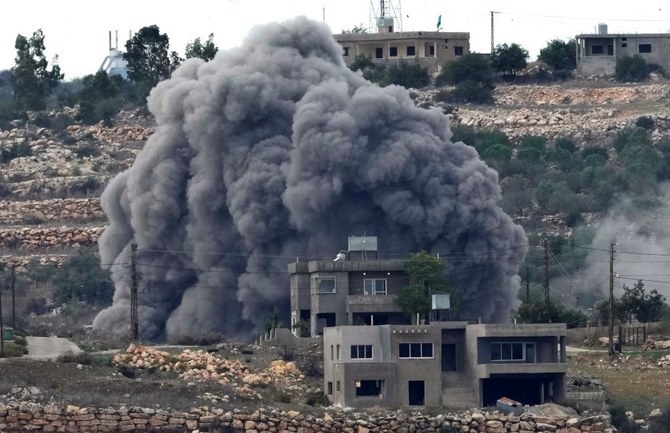
- Parliamentary speaker accuses Israel of ‘greed’ over Lebanese resources
- Berri’s statement came as hostilities between Hezbollah and the Israeli army in the southern border region entered their 230th day
BEIRUT: Lebanon is willing to cooperate with any international effort to stop Israeli aggression and bring security to the region, Parliamentary Speaker Nabih Berri said on Friday.
However, in a statement marking the 24th anniversary of Israel’s withdrawal from southern Lebanon in 2000, Berri warned that Lebanon “is not ready to waive any of its sovereign rights.”
He also accused Israel of displaying “greed toward Lebanon, its resources, its entity, and its land, sea, and air borders.”
Berri’s statement came as hostilities between Hezbollah and the Israeli army in the southern border region entered their 230th day.
The parliamentary speaker called for intensified international and regional efforts to halt Israel’s assault in the Gaza Strip, saying this was crucial to maintain security and stability in the entire region.
Hezbollah claims its actions have been in support of Gaza amid further Israeli threats to Lebanon.
Israeli Prime Minister Benjamin Netanyahu vowed on Thursday from the northern command headquarters “to carry out detailed, important and even surprising plans to return displaced settlers to the north.”
He claimed Israel had killed hundreds of Hezbollah fighters.
Benny Gantz, a minister in the Israeli war Cabinet, said: “Get ready from now on for the return of the residents of the north to their houses safely in early September by force or order.”
Berri returned from Tehran after attending the funeral of Iranian President Ebrahim Raisi, who was killed in a helicopter crash on May 19.
In his message to the Lebanese, he renewed Lebanon’s “commitment and adherence to UN Resolution 1701, and all its terms and stipulations.”
The resolution calls for an end to hostilities between Israel and Hezbollah, the withdrawal of Israeli forces from Lebanon to be replaced by Lebanese and UNIFIL forces in southern Lebanon, and the disarmament of armed groups including Hezbollah.
Berri accused Israel of ignoring the resolution “since the moment it was issued, with over 30,000 land, sea and air violations.”
Lebanon “upholds its right to defend its land with all the available means in the face of Israeli hostilities,” he said.
He called for the liberation of “the remaining occupied territory in the Kfarchouba Hills, the occupied Shebaa Farms, the northern part of the GHajjar village, and the contested border points with occupied Palestine all the way to the B1 point in Ras Al-Naqoura.”
Caretaker Minister of Defense Maurice Slim said that Lebanon preferred peace to war.
However, “defending the land was and will be the Lebanese state’s choice through the resilience of its army and people, especially the steadfast ones who are still residing in their villages and towns to repel the aggression,” he said.
Israeli warplanes on Thursday struck the town of Maroun Al-Ras in the Bint Jbeil district.
Sirens sounded in Israeli settlements opposite the border with Lebanon amid fears of possible drone attacks.
The Israeli newspaper Yedioth Ahronoth reported on Friday that Hezbollah’s drones caused significant damage in the northern towns and resulted in several fatalities.
Another newspaper, Israel Hayom, said that Hezbollah’s drones are “one of the biggest threats facing Israel in the northern arena.”
The newspaper said that Hezbollah leader Mohammed Hassan Fares, who was killed by an Israeli drone strike last week in Qana, was a scientist who specialized in robotics and machine learning.
2,000 aid trucks stuck at Rafah border: Norwegian Refugee Council
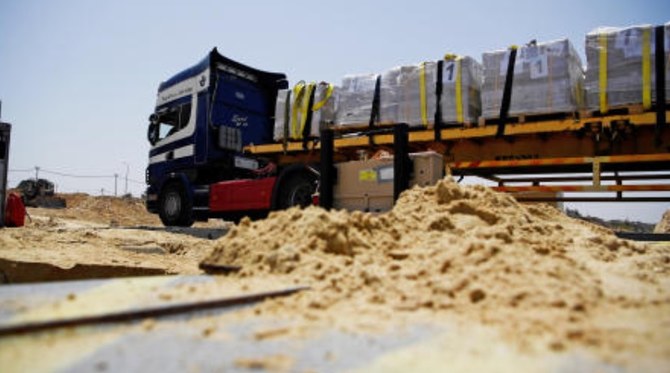
- Palestinians ‘actively deprived’ of essential items as Israel steps up operations in city
- Some in Gaza have been displaced as many as 9 times since October
LONDON: The Norwegian Refugee Council has warned that 2,000 aid trucks are stuck in Egypt at the Rafah border crossing, with Palestinians in Gaza being “actively deprived” of essential goods.
Rafah is the last remaining area of Gaza yet to come under full assault by Israeli forces, with fears now mounting of an imminent operation to take the southern city.
The NRC’s head of operations in Gaza, Suze van Meegen, told the BBC: “The city of Rafah is now comprised of three entirely different worlds: the east is an archetypal war zone, the middle is a ghost town, and the west is a congested mass of people living in deplorable conditions.”
She said medical supplies, tents, water tanks and food are being held up at the border, and in some cases Palestinians in Gaza have been displaced as many as nine times since Israel launched its military operation last October.
“People have no choice but to put their faith in so-called ‘humanitarian safe zones’ designated by the forces that have killed their family members and destroyed their homes,” she added.
Israeli journalist Amos Harel told the BBC that he believes Israel is moving ahead with plans to occupy Rafah with tacit US support.
“It’s quite clear that the Americans are no longer trying to prevent Israel from occupying Rafah. So the Israelis may proceed carefully and not too quickly. But it’s less of a question of whether the Israelis are going to occupy Rafah. It’s quite clear that they are,” he said.
It comes despite earlier warnings by US President Joe Biden against Israel attacking “population centers,” and with the International Court of Justice set to rule on the legality of the Israeli campaign in Gaza after a case was submitted by South Africa in December accusing Israel of genocide.
Escaped Iranian director receives ovations at Cannes
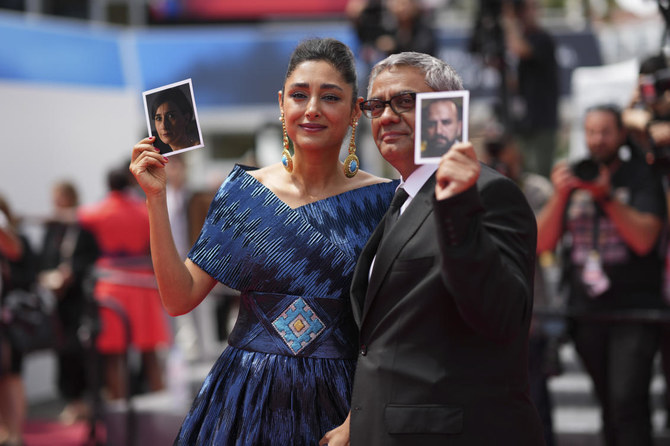
- He received raucous standing ovations before and after the gala screening of “The Seed of the Sacred Fig,” which is competing for the top prize Palme d’Or
- He attended the premiere on Friday alongside his daughter and Iranian actor Golshifteh Farahani, who lives in exile in France
CANNES, France: It is one of the most dramatic storylines ever delivered at Cannes: Iranian director Mohammad Rasoulof walked the red carpet Friday after fleeing a prison sentence in his home country just days before the film festival.
He received raucous standing ovations before and after the gala screening of “The Seed of the Sacred Fig,” which is competing for the top prize Palme d’Or.
“I hope the entire apparatus of oppression and dictatorship will disappear from Iran,” he told the packed Cannes theater, where he brandished photos of the movie’s actors.
Made underground in Iran on a tiny budget, it tells the story of a court prosecutor whose family life is torn apart by the “Women, Life, Freedom” protests that convulsed the country in 2022-23.
Friday was the last day of the Cannes Film Festival screenings, with the winners from the 22 entries to be announced on Saturday by a jury led by “Barbie” director Greta Gerwig.
Rasoulof came under pressure in Iran to withdraw his latest from the festival, but he already knew during the production that he faced a new eight-year prison sentence for “collusion against national security” and hatched a plan to escape the country.
He attended the premiere on Friday alongside his daughter and Iranian actor Golshifteh Farahani, who lives in exile in France.
Speaking after the premiere, Rasoulof said he was thinking of “everyone who allowed this film to be made — those who are here, and those who were prevented from coming.”
An outspoken critic of Iran’s rulers, Rasoulof had already served two prison terms over his uncompromising political films and had his passport revoked in 2017.
It took 28 days on the road, moving between border villages, to get out of the country, he told Deadline magazine.
“The good thing about going to prison in Iran is that you meet all kinds of youthful people who can help you in such conditions,” he told the magazine.
The final film to screen in the competition, later Friday, is “The Most Precious of Cargoes,” the first animated film to compete for the Palme d’Or since 2008’s “Waltz With Bashir.”
It is the tale of a twin thrown to safety from a death train transporting his Jewish parents to Auschwitz, from Michel Hazanavicius, director of the Oscar-winning “The Artist.”
The 77th edition of the world-famous festival has seen a lot of sex, gore and #MeToo-related issues.
A late frontrunner is “All We Imagine as Light,” which premiered Thursday.
The first Indian entry in 30 years, it is a poetic monsoon-set portrayal of two nurses who have migrated to Mumbai, described as a dreamlike five-star “triumph” by The Guardian.
“Emilia Perez,” an audacious musical about a Mexican narco boss having a sex change, has also been a favorite.
Demi Moore has emerged as a serious contender for the best actress award after rave reviews for her “fearless” performance in “The Substance,” an ultra-gory horror film about the pressures women face to maintain bodily perfection as they age.
There has been a lot of love for “Anora,” a raw and often-hilarious story about a New York erotic dancer who strikes gold with a wealthy client, only to face the wrath of his Russian oligarch parents.
Francis Ford Coppola’s ambitious fable “Megalopolis” has its admirers but proved sharply divisive, while Donald Trump biopic “The Apprentice” has drawn strong reviews as well as legal threats from the former US president.
Also on Friday, George Lucas arrived in town to accept an honorary Palme d’Or.
“It’s always great to be recognized,” said the “Star Wars” creator.
“Obviously we have a lot of fans and all that kind of stuff. But in terms of awards, I don’t make the kind of movies that win awards!“



